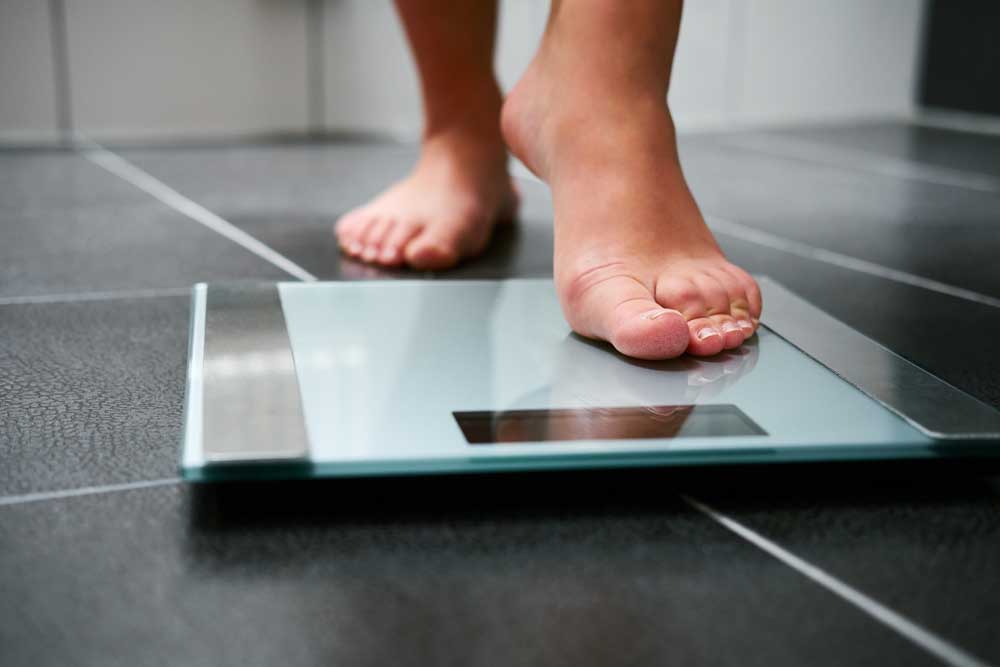In Part 1 of this series, we discussed strategies for eliminating unhelpful self-criticism about your body. In this article, we will explore frequent weighing as a potential contributor to poor body image.
Following a cognitive behavioral counseling approach, we know that it is not only negative thoughts (cognitions) that lead to low body image. In fact, there are things that we do (behaviors) that can cement feelings of worthlessness and reinforce a weight-focused sense of self-worth.
One of those behaviors is stepping on a scale. (Other common behaviors might include pinching body fat, obsessive mirror checking, constant reapplication of make-up, and so on). It’s as if we are asking the scale if we are “good enough” yet.
To help you evaluate if the scale is your friend, ask yourself the following questions:
- How do you feel after you get off the scale?
Do you experience a strong emotional response (good or bad)? For example, do you feel motivated, energized, and confident (but only if the number is on the low end)? Or do you feel guilty, ashamed, or filled with self-hatred (if the number is higher than you’d like)?
- Do you experience “should” thoughts after weighing yourself?
“Should” thoughts are our brain’s attempt at using shame as a form of motivation (i.e. “I shouldn’t have eaten so much.” “I shouldn’t be so heavy.”) Shame tends NOT to work as a source of motivation long-term. Instead, it can leave some potentially lasting emotional wounds, including feeling stuck, helpless, or filled with self-hatred.
- How often are you weighing yourself?
Many clients who see us for eating disorder counseling report weighing themselves daily, sometimes multiple times each day.
If you suspect that you have an eating disorder OR if your self-worth has become entwined with a number on a scale ask yourself if you should be weighing yourself at all. In some cases, we ask eating disordered clients to trust a registered dietitian to track their weight, as even seeing a number on the scale can trigger cruel and emotionally assaulting negative thoughts. You could even ask your doctor to weigh you backwards (also blacking out any weight numbers on your end-of-appointment handouts).
EVALUATION: If you answered “Yes” to Questions 1 & 2 above, you might need to re-examine your relationship with your scale. If weighing (Question 3) has become obsessive, time on the scale may be both unhealthy and unhelpful for you.
REDEFINING THE WEIGHT-LOSS GOAL
A goal to “lose weight” is a DEAD MAN’S GOAL. Goals that a dead man can do (i.e. “stop swearing”, “quit smoking”, “lose weight”) do not feel empowering, productive, or practical. They rarely lead to results.
Instead, shoot for goals that speak more clearly to your actual desired outcome. As yourself why you want to lose weight. Do you desire a more active lifestyle, a more vibrant romantic life, or a sense of self-confidence? If so, make those your goals instead.
For example, what if (instead of having a weight loss goal) you had a goal to GAIN HEALTH? Now that’s something a dead man can’t do! I bet you could think of much more healthy ways to measure your progress with THIS goal, rather than an arbitrary number on a scale.
For example:
- Am I eating when I’m hungry and stopping when I’m full?
- Did I care for emotions using coping strategies other than eating or restricting food?
- Have I maintained an active lifestyle today?
Challenge yourself to try out behaviors that actually promote body acceptance. It’s okay if stepping on the scale doesn’t serve that purpose for you.
To read more, check out our article BODY ACCEPTANCE PART 1: AN UNEXPECTED LESSON FROM STAR WARS. A licensed professional counselor from Star Meadow Counseling is available to assist with your body image or outpatient eating disorder goals

